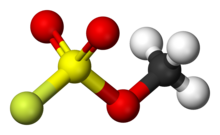Chemistry:Methyl fluorosulfonate

| |

| |
| Names | |
|---|---|
| Preferred IUPAC name
Methyl sulfurofluoridate | |
Other names
| |
| Identifiers | |
3D model (JSmol)
|
|
| ChemSpider | |
PubChem CID
|
|
| UNII | |
| |
| |
| Properties | |
| CH3FO3S | |
| Molar mass | 114.09 g·mol−1 |
| Density | 1.45 g/mL |
| Boiling point | 93 °C (199 °F; 366 K) |
Except where otherwise noted, data are given for materials in their standard state (at 25 °C [77 °F], 100 kPa). | |
| Infobox references | |
Methyl fluorosulfonate, also known as magic methyl, is the organic compound with the formula FSO2OCH3. It is a colorless liquid that is used as a strong methylating agent in organic synthesis. Because of its extreme toxicity, it has largely been replaced by the related reagent methyl trifluoromethanesulfonate.
Synthesis and reactions
It is prepared by distillation of an equimolar mixture of fluorosulfonic acid and dimethyl sulfate. It was originally produced by the reaction of methanol with fluorosulfonic acid.[1]
Methyl fluorosulfonate is a highly electrophilic reagent for methylation. It is ranked as less powerful than methyl trifluoromethanesulfonate.[2]
Toxicity
Similar to phosgene, it is acutely toxic[1] by inhalation, with an LC50 (rat, 1 hour) of about 5 ppm. Several cases of poisoning resulting in death from pulmonary edema have been reported.[3]
References
- ↑ 1.0 1.1 Meyer, Julius; Schramm, Georg (1932). "Ester der Fluorsulfonsäure (Esters of fluorosulfonic acid)". Zeitschrift für Anorganische und Allgemeine Chemie 206: 24–30. doi:10.1002/zaac.19322060103.
- ↑ Stang, Peter J.; Hanack, Michael; Subramanian, L. R. (1982). "Perfluoroalkanesulfonic Esters: Methods of Preparation and Applications in Organic Chemistry". Synthesis 1982 (2): 85–126. doi:10.1055/s-1982-29711. ISSN 0039-7881.
- ↑ Hite, M.; Rinehart, W.; Braun, W.; Peck, H. (1979). "Acute toxicity of methyl fluorosulfonate (Magic Methyl)". AIHA Journal 40 (7): 600–603. doi:10.1080/00028897708984416. PMID 484483.
 |

